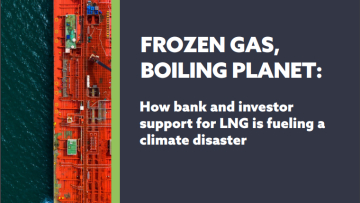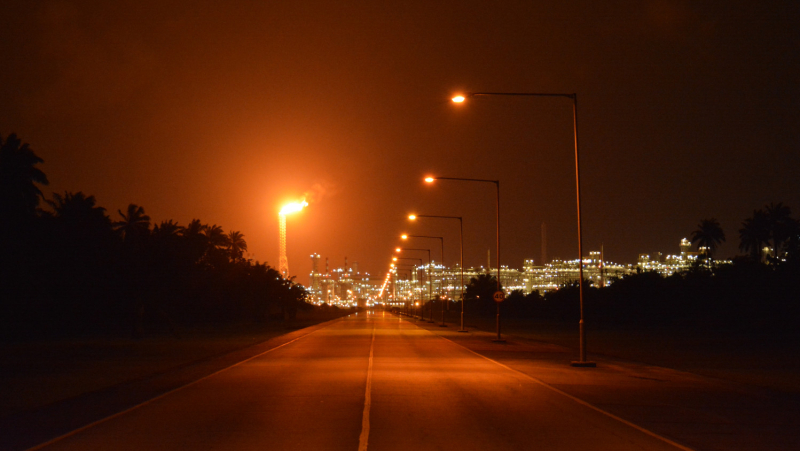
Project – On record
This profile is no longer actively maintained, with the information now possibly out of dateBankTrack

Project – On record
This profile is no longer actively maintained, with the information now possibly out of dateBankTrack
Why this profile?
For more than 20 years, this project has proven to be harmful to local communities. Its expansion would further threaten livelihoods and the local environment, increasing pollution and damaging important ecosystems.
What must happen
People who are still waiting for resettlement compensation must be paid. The project’s expansion should be cancelled to avoid further pollution, deforestation and local economic damage. SMBC Group and Guaranty Trust Bank of Nigeria should resign as Nigeria LNG’s finance advisors, while all involved banks should refuse to finance the expansion.
| Sectors | LNG Terminal |
| Location |
|
| Status |
Planning
Design
Agreement
Construction
Operation
Closure
Decommission
|
| Website | https://www.nigerialng.com |
Nigeria LNG Limited (NLNG) is a liquified natural gas (LNG) terminal, located on 2.27 square kilometres of largely reclaimed land in Finima, on the Niger Delta’s Bonny Island. In operation since 1999, the facility consists of six trains (processing units) that together are able to produce 22 million tonnes per annum (mtpa) of LNG, which is approximately 6% of global LNG trade. The project is a joint venture between Nigerian National Petroleum Corporation (NNPC), Shell Gas B.V., TotalEnergies and ENI International. The construction of Train 7 started in June 2021 and will increase the total production capacity to 30mtpa.
Impact on human rights and communities
Displacement and the loss of livelihoods awaited the communities of Bonny Island when Nigeria LNG arrived. Starting in 1991, locals were relocated from ‘Old Finima Community’ to ‘New Finima Community’ to make way for construction. New Finima is a reclaimed mangrove area that was not suitable for the traditional occupations of those who moved there – such as fishing, hunting, farming, carving and weaving – and many lost their main income source. Many faced intimidation during the relocation process, for which a military task force was often used. Among this displaced population are Indigenous communities, dealing with the trauma of being forced from ancestral lands.
Unfulfilled promises of compensation and lease agreements have been made by Nigeria LNG, while the Nigerian government has also not delivered on due compensation: The 1978 Land Use Act allows the state to acquire land in matters of overriding public interest, but compensation must be paid. As recently as January 2022, communities are still claiming they have not received compensation.
Social inequality has increased on Bonny Island since Nigeria LNG arrived, according to reports by Africa-based civil society organisations. Except for some menial jobs, most Nigeria LNG plant workers came from other regions. In Nigeria LNG’s own Environmental, Social and Health Impact Assessment (ESHIA) for Train 7, the company acknowledges that local employment and skill acquisition opportunities will mostly be temporary: “after the construction works, thousands will depart and the area will be left with environmental and human impacts from increased urbanisation and rural land abandonment”.
Long-term social unrest includes protests as recently as June 2021, when Finima community members temporarily closed down the facility to reassert themselves as the rightful hosts of the land Nigeria LNG occupies. In 1999, the facility’s first shipment was delayed after protestors attacked the plant. Since then, wider unrest has been stoked by the increasingly uneven distribution of gas-generated wealth in the Niger Delta. The authorities’ increasingly militarised and violent responses to these sentiments and actions are not easing an already tense situation.
Pollution-related health problems in the local community that can be attributed to Nigeria LNG gas flaring include kidney problems, lung damage, cancer and neurological and reproductive problems among pregnant women and infants. The average life expectancy of the area has decreased with the arrival of the fossil fuel industry.
Women and girls have suffered disproportionately due to a number of factors, predominantly rooted in the local poverty caused by the project: decreasing household income can force young girls out of school, which increases rates of teen pregnancies, prostitution and STD transmission rates.
Impact on climate
Climate change is being felt more keenly in Africa than in other parts of the world. Prolonged droughts, floods and other harmful weather events are affecting the livelihood of millions of people across the continent. Support for and expansion of fossil fuel extraction poses the risk of significant debt and does not align with Paris Agreement goals. Train 7’s ESHIA claims the project will improve NLNG’s energy efficiency, but its overall greenhouse gas emissions will still increase. When NLNG’s removal of around 31 hectares of local carbon sinks such as forest and swamp is also taken into account, it is clear that Nigeria LNG is exacerbating climate change.
Impact on nature and environment
The loss of natural areas and their associated biodiversity has occurred during Nigeria LNG’s land reclamation. For example, marine species have lost breeding grounds. The Niger Delta is the world’s second-largest wetland, of which 2.27 square kilometres – mostly swamp and low-lying rainforest – have been given over to NLNG’s plant.
This already dire environmental situation will worsen with the construction of Train 7. More swamp and forest land must be cleared to build its workers’ village, in a region where the rate of deforestation is already high. The installation of canals and increased shipping activities will then cause an influx of seawater, further threatening the forest.
An LNG-linked reduction in Bonny Island’s air quality is set to be aggravated by NLNG’s Train 7 project expansion.
Other impacts
Corruption scandals have been unearthed by journalists investigating Nigeria LNG. In February 2022, it was reported that LNG was being illegally exported to North and South American countries. This was made possible for more than 20 years through international cartels, led by several highly influential individuals with the support of NLNG. From 2009 to 2013, more than USD 1 billion worth of hydrocarbon products were exported to countries such as Argentina, Brazil, Mexico and the United States. Nigeria LNG denied the claims, demanding a retraction.
Nigeria LNG’s Train 7 expansion project reached financial close in May 2020, for a total of USD 2.77 billion. This amount is supported by three export credit agencies: SACE (Italy), K-SURE and KEXIM (both South Korea). Each offered guarantees on the Train 7 loans that were provided by the commercial banks listed below.
Nigeria LNG is an Incorporated Joint Venture owned by the Nigerian National Petroleum Corporation (NNPC; 49%), Shell Gas B.V. (25.6%), TotalEnergies Gaz & Electricité Holdings (15%) and ENI International N.A. N.V. S.àr.l (10.4%).
Nigerian National Petroleum Corporation (NNPC)
NigeriaApplicable norms and standards
Land Use Act of 1978, Nigeria
Protesters picket Nigeria LNG on Bonny Island
2022
2022-07-23 00:00:00 | EU explores additional Nigerian gas imports to replace Russian supplies
In anticipation of Russian supply cuts, the European Union is looking to increase Nigerian LNG imports, which currently account for 14% of the bloc’s supply. NLNG is operating at 60% capacity due to pipe vandalism and must reach 80% capacity to satisfy the extra demand.
2020
2020-05-13 00:00:00 | Contracts awarded for Nigerian Train 7 LNG project
Nigeria LNG has announced that the Engineering, Procurement and Construction contracts for its Train 7 expansion project have been awarded to the SCD JV consortium, comprising affiliates of Saipem, Chiyoda and Daewoo.
2019
2019-12-27 00:00:00 | Nigeria LNG signs Train 7 FID
NNPC, Shell Gas B.V., TotalEnergies and ENI International have agreed upon the Final Investment Decision for Nigeria LNG’s Train 7 expansion. It is projected to increase the facility's LNG annual output by 35%, to 30 million tonnes. Guaranty Trust Bank of Nigeria and Sumitomo Mitsui Banking Corp (SMBC) were appointed Train 7’s financial advisers earlier this year.
2019-08-05 00:00:00 | NLNG releases ESHIA for Train 7 expansion
Nigeria LNG has published the Environmental, Social and Health Impact Assessment (ESHIA) report for its Train 7 expansion project. NLNG’s CEO Tony Attah: “At several instances, we consulted our most important stakeholders – our direct neighbours on Bonny Island – about the intricacies of the plans, the impacts and mitigations, and about their concerns and expectations.”
2007
2007-12-03 00:00:00 | Operations commence from Nigeria LNG’s Train 6 expansion
The Nigeria LNG plant’s latest expansion, Train 6, has joined production. Construction of the plant began in February 1996 and a steady expansion campaign has followed, with Trains 1-5 coming online between 12th August 1999 and February 2006.


